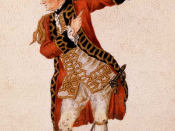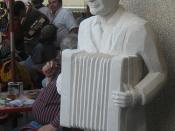In the Elizabethan Era, a society dominated by men, women had little input. Common rights and abilities of our time such as voting, going to school, and achieving steady jobs were impossible for the average Elizabethan woman to achieve. This disparity of power prominently appears in the works of the time period's most well-known playwright, William Shakespeare. In his "Much Ado about Nothing", Beatrice, one of the most powerful women in all of Shakespeare's work, complains of feeling weak and impotent in the face of the play's overbearing men. Her sympathetic portrayal throughout Much Ado suggests Shakespeare's staunch disapproval of the traditional Elizabethan gender roles.
It is easy to understand why Beatrice feels this way toward the men in the play, the social, educational and professional opportunities for women in the Elizabethan era were quite limited, and many of the women who did manage to enter a profession usually picked a domestic service such as a maid or cook.
Women were also allowed to write literature but were rarely published. Going to school was for boys only, but girls were allowed to be tutored at home. Women could not be heirs to their father's belongings or estates either; it usually was passed on to the son or brother of the father in some cases. The only exception in this law was the crown. The crown could be pasted to the daughter along with the power it holds. Women could be heiresses to the property though. (Alchin, Linda. "Elizabethan Women.")
Unable to land pleasant jobs or take control of their own lives, women back in the 1600's had only one "real" goal in life, which was to get married and bear children. Marriages were usually arranged by treaties so that each party knew what they were giving...


